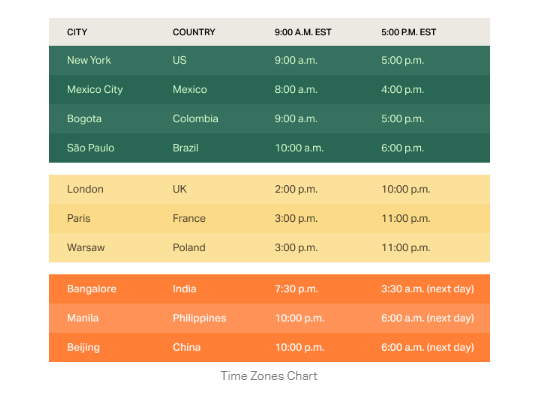Key Takeaways
- Selecting the right destination for software development offshoring involves balancing cost with factors such as technical expertise, English proficiency, and time zone compatibility to maximize project success.
- Emerging trends, such as hybrid outsourcing models and the strong emphasis on data security, should shape how businesses approach offshore development.
- Instead of looking for the lowest rates, focus on value by selecting countries with a good cultural fit and political stability to get the best results from outsourcing.
Thinking about outsourcing your software development projects in 2025? The location of your software development partner can make a difference in balancing cost-efficiency with technical expertise. While onshore options might offer convenience, going offshore can increase your opportunities and possibilities by expanding the pool of potential talent to choose from.
We’ve compiled a list of 15 countries leading the charge in offshore software development, offering a simple comparison based on technical know-how, English proficiency, and time zone advantages. We’ll also look at how to choose the right destination for your software development project.
What Makes a Country an Offshore Software Development Hot Spot?
Curious about what makes a country a hot spot for offshoring software development? Some geographic locations are considered hubs for technological innovation and development, where there is a high concentration of tech companies leading technological trends and advancement. These hot spots are prime locations for finding software development partners to help businesses with their development needs.
Whether a country can be considered a hot spot for offshoring software development comes down to a mix of several core criteria. Let’s break them down.
Availability of skilled developers
Countries that produce a steady stream of capable IT graduates and professionals tend to stand out, as having a sizable pool of skilled developers is a big draw. India, for example, produces over a million engineering graduates annually, making it a country with a vast pool of available tech talent ready to help businesses with their software development needs.
Competitive rates
The allure of cost savings drives many businesses to outsource. Countries that offer cost-effective solutions without compromising on quality naturally tend to be the most attractive.
The average hourly rate for software development in Ukraine, for example, ranges from $35 to $60, which is significantly lower than the $100 per hour average rate in the US, making this country an appealing destination for finding affordable offshore software developers.
Cultural and language alignment
Cultural proximity and language proficiency are key to smooth communication and collaboration. Eastern European countries score high in English proficiency, facilitating better integration with English-speaking teams.
Political and economic stability
Political and economic stability provide uninterrupted business operations. Nations with a consistent and favorable business environment attract more investment in the tech sector. Poland has gained recognition for its economic growth and supportive business environment, attracting substantial investment in the tech sector.

Top 15 Offshore Software Development Hot Spots in 2025
So, where are the offshore software development hot spots where you can find the best mix of cost-effectiveness, talent, and business-friendly environments? Let’s take a look.
1. India
India boasts a large, skilled workforce and a rapidly growing tech industry, which is supported by numerous prestigious technical institutes. The country is noted for its innovative startups and significant contributions to global tech development.
Major tech hubs: Bangalore (AI, cloud computing), Hyderabad (mobile development, blockchain)
English proficiency: High, thanks to a history of English-based education
Time zone: Indian Standard Time (IST), 9.5 hours ahead of EST
2. Ukraine
Ukraine is known for its strong education system in technical fields, producing a high number of STEM graduates with excellent technical skills. The local IT sector is characterized by a robust outsourcing industry and a rich pool of tech talent.
Major tech hubs: Kyiv (software development, IT services), Lviv (AI, data science)
English proficiency: Moderate to high, with a strong technical vocabulary
Time zone: Eastern European Time (EET), 7 hours ahead of EST
3. Poland
Poland's tech scene is bolstered by a favorable business environment and government support for innovation. The country is a leading player in Central Europe's tech landscape, offering a strong foundation in both software and hardware expertise.
Major tech hubs: Warsaw (cybersecurity, fintech), Kraków (machine learning, software development)
English proficiency: High, as the country is culturally aligned with Western Europe and the US
Time zone: Central European Time (CET), 6 hours ahead of EST
4. Brazil
Brazil's tech industry benefits from a large domestic market and vibrant startup ecosystems. Its increasing focus on innovation and entrepreneurship drives significant advancements in many technology sectors.
Major tech hubs: São Paulo (app development, fintech), Campinas (AI, blockchain)
English proficiency: Moderate, with a growing emphasis on bilingual education
Time zone: Brasília Time (BRT), 1 hour ahead of EST
5. Argentina
Argentina’s tech industry is recognized for its creative talent and expertise in software development. The country has also established itself as a leader in technology export, particularly within Latin America.
Major tech hubs: Buenos Aires (software development, cloud solutions), Córdoba (IoT, mobile apps)
English proficiency: Moderate, with cultural compatibility focused on Western partnerships
Time zone: Argentina Time (ART), 2 hours ahead of EST
6. Mexico
Mexico is a strategic location for North American tech companies for its nearshore services. The rise of tech clusters across multiple regions supports its growth as a major IT player.
Major tech hubs: Mexico City (fintech, mobile development), Guadalajara (software development, AI)
English proficiency: Moderate to high, benefiting from the country’s proximity to the US
Time zone: Central Standard Time (CST), same as EST or 1-3 hours behind
7. Colombia
Colombia is a competitive tech hub in Latin America, driven by government initiatives promoting digital transformation and entrepreneurship. The country's tech scene stands out for its adaptability and innovation.
Major tech hubs: Bogotá (cloud computing, AI), Medellín (software development, blockchain)
English proficiency: Improving steadily, with an increasing number of bilingual professionals
Time zone: Colombia Time (COT), same as EST
8. Costa Rica
Costa Rica benefits from political stability and a strong focus on sustainability, making it a hot spot for tech companies. Its strong investment in education and training keeps its tech talent sharp.
Major tech hubs: San José (fintech, software development), Heredia (IT services, cloud computing)
English proficiency: High, culturally aligned with US practices
Time zone: Central Standard Time (CST), 1 hour behind EST
9. Vietnam
Vietnam is known for its buzzing tech startup scene and robust manufacturing capabilities. With an expanding tech infrastructure, it's becoming an attractive destination for foreign investment and partnerships.
Major tech hubs: Ho Chi Minh City (mobile apps, blockchain), Hanoi (software development, AI)
English proficiency: Moderate, focused on technical fields
Time zone: Indochina Time (ICT), 12 hours ahead of EST
10. The Philippines
With a strong outsourcing industry, The Philippines has become a key player in delivering BPO services and IT solutions globally. Its tech sector is supported by a young, tech-savvy workforce.
Major tech hubs: Manila (BPO, software development), Cebu City (AI, IT services)
English proficiency: High, with English as an official language
Time zone: Philippine Time (PHT), 13 hours ahead of EST
11. Romania
Romania is recognized for its innovation in technology and growing influence in the European tech industry. Despite its favorable tax policies and vast talent pool, it's an underrated choice for outsourcing.
Major tech hubs: Bucharest (cybersecurity, web development), Cluj-Napoca (AI, software solutions)
English proficiency: High, with strong Western cultural ties
Time zone: Eastern European Time (EET), 7 hours ahead of EST
12. Indonesia
Indonesia's tech ecosystem is thriving with a burgeoning startup culture and a rapidly growing digital economy. The country is capitalizing on its large, youthful population and expanding internet connectivity.
Major tech hubs: Jakarta (e-commerce, fintech), Bandung (software development, IT services)
English proficiency: Moderate, improving with a focus on the tech industry
Time zone: Western Indonesia Time (WIB), 12 hours ahead of EST
13. Portugal
Portugal's tech ecosystem is benefiting from a wave of entrepreneurship and innovation supported by government and private sector initiatives. The country is gaining recognition for its digital transformation efforts.
Major tech hubs: Lisbon (fintech, AI), Porto (software development, gaming)
English proficiency: High, with extensive cultural alignment with Western Europe
Time zone: Western European Time (WET), 5 hours ahead of EST
14. Egypt
Egypt's tech industry is expanding, with strong government backing for tech initiatives and innovation. Its strategic location connects it with markets in the Middle East and Africa.
Major tech hubs: Cairo (AI, fintech), Alexandria (software development, mobile apps)
English proficiency: Moderate, with increasing bilingual graduates
Time zone: Eastern European Time (EET), 7 hours ahead of EST
15. South Africa
South Africa is recognized as a technology leader with significant investments in digital infrastructure. The nation's multicultural environment fosters diverse viewpoints, which help to create innovative solutions.
Major tech hubs: Cape Town (software development, fintech), Johannesburg (AI, data science)
English proficiency: High, with English as one of the official languages
Time zone: South Africa Standard Time (SAST), 7 hours ahead of EST
Emerging Trends in Offshore Software Development
With the offshore software development landscape constantly evolving, it’s bound to have an impact on how you’ll approach outsourcing. Staying up to date on the trends will help you stay competitive and outsource with the latest tech in mind. Here are some of the key trends shaping offshore software development right now.
Hybrid outsourcing models
Companies are increasingly adopting hybrid models that combine onshore and offshore development teams. This approach lets businesses capitalize on the cost benefits of offshoring while maintaining the closer collaboration of local and in-house teams.
Rise of nearshoring
Nearshoring is gaining traction as companies look to minimize time zone differences and boost cultural alignment. Regions like Latin America are particularly attractive because of their proximity to the US, making collaboration easy.
Growth in niche tech skills
There's a surging demand for specialized tech skills, such as AI, blockchain, and cybersecurity. Offshore destinations are responding by developing talent pools that cater to these niche areas, further solidifying their positions as tech hubs.
Emphasis on data security
With cyber threats increasing, data security has become a top priority for outsourcing decisions. Countries that offer strict data protection laws and adhere to global security standards are becoming more appealing to businesses seeking robust and reliable data security.
The use of Agile and DevOps practices
Agile and DevOps methodologies enhance flexibility and accelerate development and delivery times. Companies now expect their offshore partners to align with these practices so projects meet the standards for fast-paced, iterative development.
To get deeper insights into evolving trends in offshore development, check out “Top Offshore Software Development Trends You Need To Know.”
How to Choose the Right Offshore Software Development Location for Your Business
Eventually, it comes time to make a choice. Considering the following factors will help you pick a location that offers the best fit and balance between cultural compatibility, cost-effectiveness, and talent.
1. Evaluate the talent pool
The country you’re eyeing should have a solid pool of skilled developers, particularly in the tech relevant to your project. Look for places with tech hubs and educational institutions that supply fresh talent.
2. Consider English proficiency and cultural compatibility
Good communication and cultural alignment are key for smooth collaboration. Go for countries with high English proficiency and cultural similarities for fewer misunderstandings.
3. Analyze time zone advantages
Select a location with a time zone that allows for a few hours of overlap with your working hours. This fosters better communication and collaboration between your in-house and offshore teams, making real-time problem-solving possible. Here's a visual overview of time zone considerations:

4. Focus on value, not just cost
While low rates might seem tempting, focusing solely on the cheapest option can backfire, as you may end up sacrificing quality. Look at the bigger picture, including quality of work, skills, and ability to meet deadlines. For a deeper dive, refer to our article on offshore developer rates.
5. Assess political and economic stability
Choose countries with stable political and economic environments to minimize the risks of governmental changes or economic downturns affecting your projects.
6. Avoid common pitfalls
Your chosen location should follow international data protection standards to keep your information and documents safe. Also, make sure your contracts are flexible enough to accommodate any changes.
For detailed guidance on recruiting offshore talent effectively, explore “How To Hire Offshore Software Developers in 2025: A Comprehensive Guide.”

Final Thoughts
The top offshore software development hot spots for 2025 all come with their own perks. To make the right choice, focus on value, not just cost. Pay attention to the availability of skilled developers, English proficiency, cultural fit, and time zone compatibility.
At Near, we specialize in connecting you with top-tier talent based in Latin America so you can thrive in the offshore landscape. Whatever you’re looking for, we have a robust list of pre-vetted candidates ready to meet your needs.
Take the next step in optimizing your offshore strategy: book a free consultation call to explore how we can support you in building your ideal team.













.png)






%20(1).png)
%20(1).png)